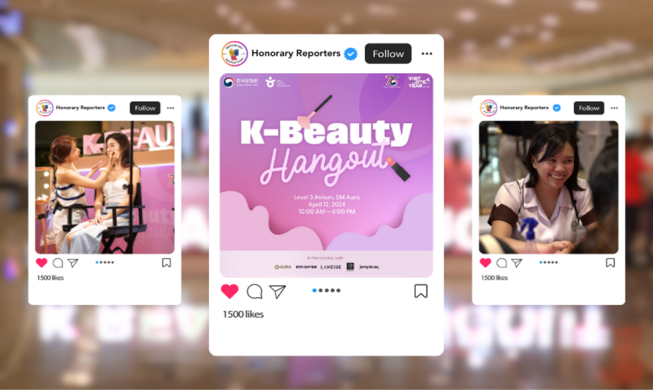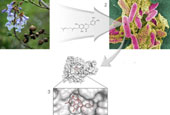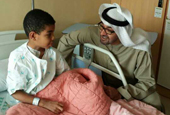-
 Korea.net's 24-hour YouTube channel
Korea.net's 24-hour YouTube channel- NEWS FOCUS
- ABOUT KOREA
- EVENTS
- RESOURCES
- GOVERNMENT
- ABOUT US
Bio & Medical Korea 2014, one of Asia's biggest medical and health fairs, was held over three days beginning May 28. Held at KINTEX in Gyeonggi-do (Gyeonggi Province), northwest of Seoul, the event featured 300 pharmaceutical companies, medical equipment manufacturers and hospitals from around the world. Some 20,000 participants from 40 nations showed off their latest products and technologies during the convention's run.
At a conference held as part of the event, 250 professionals from many countries exchanged information and opinions on a range of issues, including, "developing new technologies to increase the effects of a vaccine," the "convergence of medical, health and information technology," and "the export of medical systems and its future."
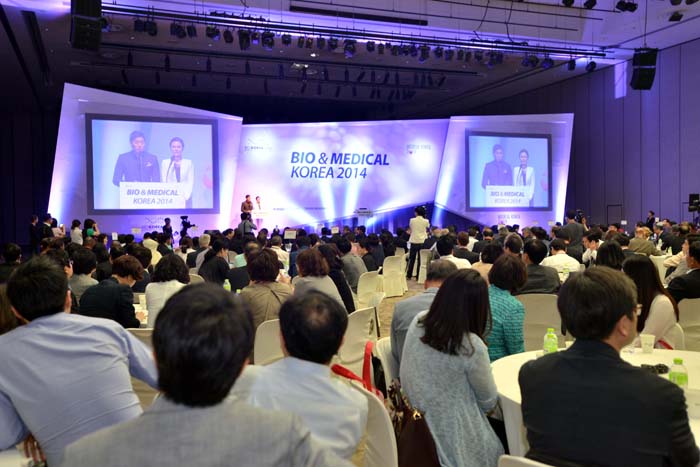
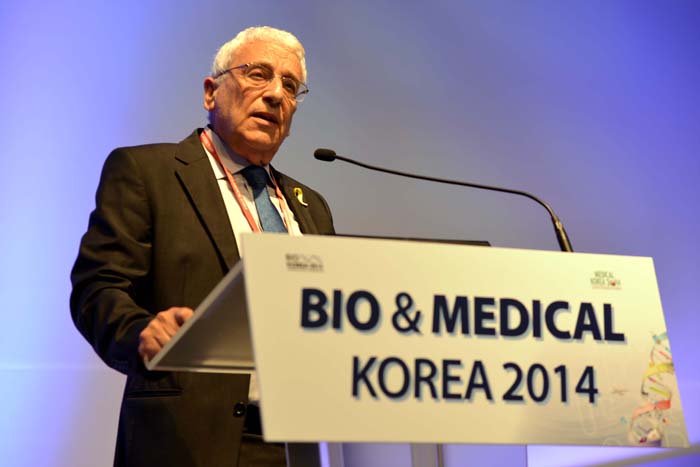
In the opening speech, Yigal Erlich, chairman of the Yozma Fund, an Israeli private-public investment fund, said, "There are many obstacles to raising capital because the biotechnology industry requires long-term investment and poses high risk. Recently, the biotechnology industry has been converging with the information technology industry and crowd funding is expanding. There will be more investment in biotechnology and medical industries."
Erlich said the government needs to support the biotechnology industry without fear of failure. "Many investments in startups failed in Israel before 1993, but with the establishment of the Yozma Fund, the Israeli government started bearing high risk and foreign asset management companies recognized this and formed a global network, which led to huge success," he added.
Koh Han-seung, CEO of Samsung Bioepis, said during a conference on biosimilars that a single antibody market would be worth KRW 7 trillion to KRW 10 trillion.
"There are 26 to 36 companies, including those in the R&D stages, involved in biosimilar products, but there will only be a handful of companies that survive in ten years," Koh said. "If microorganism fermentation technology is applied to the biosimliar market, it would be able to continue to grow for the next 20 to 30 years."
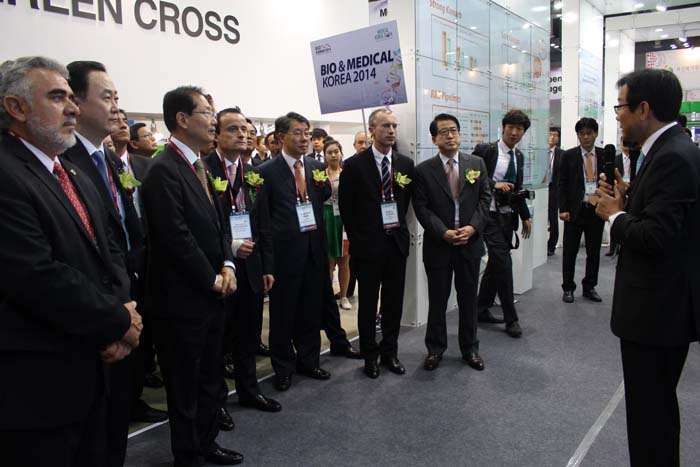
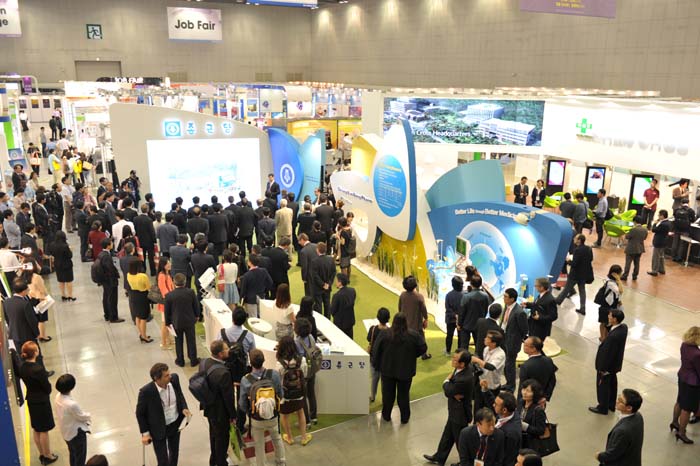
At the event, over 400 companies from 30 nations held negotiations on potential exports and investment. Foreign pharmaceutical companies from ten countries, including the U.S., Saudi Arabia, the United Arab Emirates, Ukraine and Russia, and nine Korean pharmaceutical companies signed some 12 deals.
As part of Bio & Medical Korea, there was also the Pharm Fair, which is geared toward pharmaceutical products, the Medtech Fair, focused on medical equipment, and the Invest Fair, an investment seminar, all sister events of the main exhibition."
By Limb Jae-un
Korea.net Staff Writer
jun2@korea.kr

At a conference held as part of the event, 250 professionals from many countries exchanged information and opinions on a range of issues, including, "developing new technologies to increase the effects of a vaccine," the "convergence of medical, health and information technology," and "the export of medical systems and its future."


(Top) The opening ceremony of the Bio & Medical Korea 2014 is held at Kintex, in Gyeonggi-do (Gyeonggi Province), on May 28. (Bottom) Yigal Erlich, chairman of the Yozma Fund, gives the opening speech at the event. (photos courtesy of the Korea Health Industry Development Institute)
In the opening speech, Yigal Erlich, chairman of the Yozma Fund, an Israeli private-public investment fund, said, "There are many obstacles to raising capital because the biotechnology industry requires long-term investment and poses high risk. Recently, the biotechnology industry has been converging with the information technology industry and crowd funding is expanding. There will be more investment in biotechnology and medical industries."
Erlich said the government needs to support the biotechnology industry without fear of failure. "Many investments in startups failed in Israel before 1993, but with the establishment of the Yozma Fund, the Israeli government started bearing high risk and foreign asset management companies recognized this and formed a global network, which led to huge success," he added.
Koh Han-seung, CEO of Samsung Bioepis, said during a conference on biosimilars that a single antibody market would be worth KRW 7 trillion to KRW 10 trillion.
"There are 26 to 36 companies, including those in the R&D stages, involved in biosimilar products, but there will only be a handful of companies that survive in ten years," Koh said. "If microorganism fermentation technology is applied to the biosimliar market, it would be able to continue to grow for the next 20 to 30 years."


(Top) VIPs at the Bio & Medical Korea 2014 exhibition look around the venue on May 28. (Bottom) Some 20,000 participants from 40 nations have introduced their latest products and technologies at the fair. (photos courtesy of the Korea Health Industry Development Institute)
At the event, over 400 companies from 30 nations held negotiations on potential exports and investment. Foreign pharmaceutical companies from ten countries, including the U.S., Saudi Arabia, the United Arab Emirates, Ukraine and Russia, and nine Korean pharmaceutical companies signed some 12 deals.
As part of Bio & Medical Korea, there was also the Pharm Fair, which is geared toward pharmaceutical products, the Medtech Fair, focused on medical equipment, and the Invest Fair, an investment seminar, all sister events of the main exhibition."
By Limb Jae-un
Korea.net Staff Writer
jun2@korea.kr
Related Contents
Most popular
- First hearing-impaired K-pop act hopes for 'barrier-free world'
- Event 'K-Beauty Hang Out' draws hundreds in Philippines
- Ceremony in Seoul inducts 2,641 content creators of Korean culture
- 'Mad Max' director impressed by 'cinema-literate' Korean viewers
- Cultural spring festival Seoul Festa to start on May 1




